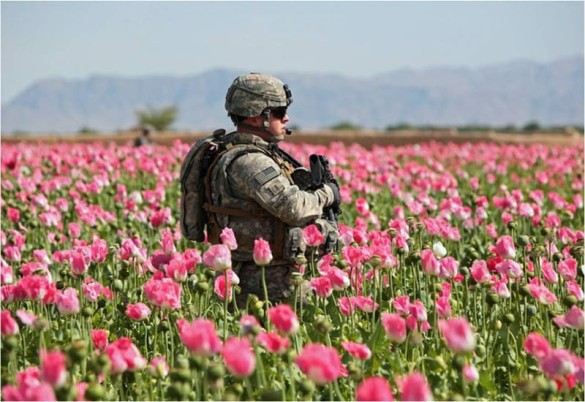
At TomDispatch, Alfred W. McCoy writes:
To understand the Afghan War, one basic point must be grasped: in poor nations with weak state services, agriculture is the foundation for all politics, binding villagers to the government or warlords or rebels. The ultimate aim of counterinsurgency strategy is always to establish the state’s authority. When the economy is illicit and by definition beyond government control, this task becomes monumental. If the insurgents capture that illicit economy, as the Taliban have done, then the task becomes little short of insurmountable.
Opium is an illegal drug, but Afghanistan’s poppy crop is still grounded in networks of social trust that tie people together at each step in the chain of production. Crop loans are necessary for planting, labor exchange for harvesting, stability for marketing, and security for shipment. So dominant and problematic is the opium economy in Afghanistan today that a question Washington has avoided for the past nine years must be asked: Can anyone pacify a full-blown narco-state?
The answer to this critical question lies in the history of the three Afghan wars in which Washington has been involved over the past 30 years — the CIA covert warfare of the 1980s, the civil war of the 1990s (fueled at its start by $900 million in CIA funding), and since 2001, the U.S. invasion, occupation, and counterinsurgency campaigns. In each of these conflicts, Washington has tolerated drug trafficking by its Afghan allies as the price of military success — a policy of benign neglect that has helped make Afghanistan today the world’s number one narco-state.


If memory serves me right, along with the history lessons I was taught when I attended school, (back in the 20th century), The U.S.Military was always used as an enforcer for the Business establishment’s interests around the World. The profits from the Opium are just too great to give up. Just like the addict, the greed that goes with the profit, is perhaps impossible to give up. After all, isn’t one of the first rules of Business/Warfare called “Collateral” damage? Hence, the addict/taxpayer of the infected countries. I recall a scene from the “Godfather” when the dealing of heroin was discussed, which I won’t repeat here, but brushing away all the fluff, seems to sum it up for where I’m coming from.